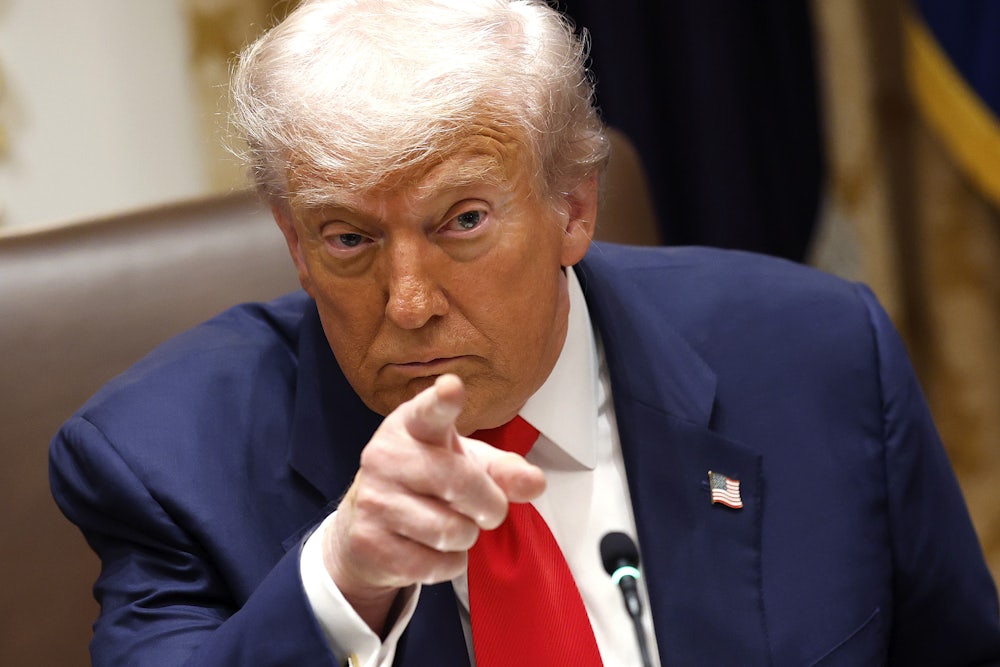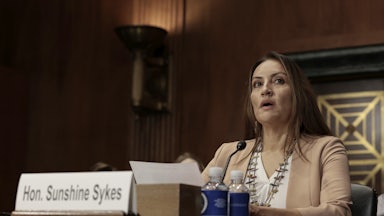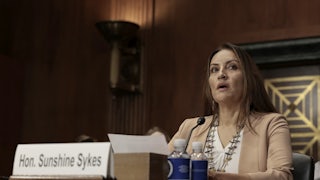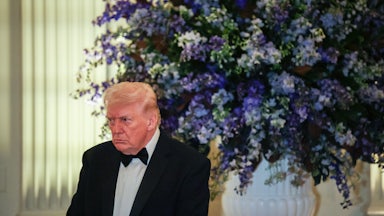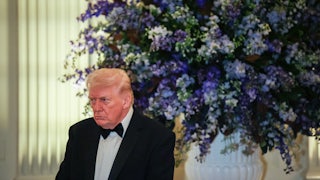“Previously a voice for the canceled, they’re now the ones canceling,” intoned NBC News last month in a story, headlined “Trump and Republicans find themselves on the other side of the cancel culture wars,” on the right-wing blitzkrieg against anyone who dared criticize Charlie Kirk in the weeks after his assassination. The New York Times reported that in seeking to punish offensive speech, Republicans were “trying to rebrand a practice they once maligned.” Former President Barack Obama made a similar comparison after Jimmy Kimmel was suspended amid the Trump administration’s threats to retaliate against media outlets. “After years of complaining about cancel culture,” Obama wrote on X, “the current administration has taken it to a new and dangerous level.”
Obama is right that the Trump administration’s attacks are “new and dangerous,” but where he’s wrong—perhaps in a clumsy attempt to be evenhanded—is that they don’t even belong in the same conversation as “cancel culture.” This is organized state repression, veering crassly and thuggishly into a reign of terror.
To use one of Obama’s favorite phrases, let’s be clear: “Cancel culture” refers to the prosecutorial and puritanical style of liberalism that became popular on the internet during the second half of the Obama administration and intensified during Trump’s first term, when the algorithms rewarded outrage but we were all still relatively new to the power and incentives of social media. It was a bad vibe. Discursive mistakes—insensitive jokes, ill-conceived tweets—could attract a mob of internet denunciation. The term could be overused, at times seeming to imply that people were out of line in criticizing celebrities and other powerful people for abusive behavior. But at its worst, cancel culture undermined solidarities, encouraged the bullying of some vulnerable people, and drove others to the right. Even worse, some of its targets lost their livelihoods.
This last aspect of cancel culture was its most pernicious, and at the time I called it “‘You’re Fired!’ liberalism.” (Yes, I was invoking The Apprentice.) I argued that while trying to get opponents dismissed from their jobs was an appropriate tactic for the right, given their apparent comfort with the cruelly precarious conditions for employees under neoliberal capitalism, it was unworthy of the left and would only expand the “anxious, resentful electorate that put Trump into power.” Unfortunately, I was right about that.
As misguided as “cancel culture” was, though, that’s not what Trump and his minions are up to today. Yes, the right’s leading influencers, from Vice President JD Vance to Laura Loomer, have whipped up the MAGA mob to get people—not only public figures like Jimmy Kimmel but public school teachers and crossing guards—fired from their jobs for opinions on Kirk that it deems unacceptable.
But the Trump administration’s approach to unwelcome speech is far worse than that. “Cancel culture” never involved the machinery of the federal government, yet Trump’s defense secretary, Pete Hegseth, is banning journalists from the Pentagon who won’t agree to government-imposed restrictions on their reporting, and has deemed these new rules—rejected by every legitimate news outlet—necessary to regulate a “very disruptive” press. Speaking of the Pentagon, Hegseth is also presiding over McCarthyite investigations within the agency to root out employees who aren’t fans of Charlie Kirk.
Then there is the misuse of law enforcement powers to punish anti-Trump public figures. Last month, in a Truth Social post, Trump told Attorney General Pam Bondi that failure to prosecute his political adversaries was “killing our reputation and credibility.” Soon afterward, federal prosecutors brought weak and clearly contrived cases against James Comey and New York Attorney General Tish James. While the charges against John Bolton aren’t considered to be quite as flimsy, the prosecution of Trump’s own former national security adviser is obviously nakedly political in the same way.
“Cancel culture” just isn’t an adequate description for moves like that, nor for the blatant witch hunts Trump’s government is conducting against countless regular people who have never held significant positions of power but have participated in peaceful protest, written an op-ed, or posted on social media. Trump is using the federal government’s powers to try to deport such people when he doesn’t agree with their politics, including student activists like Columbia University’s Mahmoud Khalil, Tufts University’s Rümeysa Öztürk, and many others. At least six people have had their visas canceled because of remarks made about Charlie Kirk on social media, a move that Trump’s State Department is not trying to hide but has celebrated in an X thread.
Then there are the threats of violence. As juvenile as it was for Trump to post an AI-generated video of himself as a king dumping poop on the “No Kings” demonstrations, it’s also quite scary, especially from a president who has already demonstrated his willingness to send in the military against protesters and who, during his first administration, asked his staff if it would be possible to shoot Black Lives Matter demonstrators.
And for all the talk of liberal “cancel culture” within the academy (where indeed, some students and professors did sometimes face blowback for views offensive to the left), that’s no analogue to Trump’s assault on academic freedom, which is easily the worst by the federal government since the McCarthy era. Trump is using federal funding as a cudgel to punish or prevent speech he does not like, whether at a protest on the green or in the curriculum itself.
It’s not outlandish to suggest that aspects of left “cancel culture” contributed to what we’re seeing today. Cancel culture may have softened us up to accept an illiberal logic, undermining values like free speech and academic freedom. On campus, for example, notions that speech shouldn’t be allowed if it makes people feel “unsafe”—an argument sometimes used against allowing certain conservative speakers on campus—have been deployed effectively by the right to argue that pro-Palestinian protest, or criticism of Kirk, is violent or hateful. And conservatives are now using the liberal term “consequence culture” to argue that irresponsible speech should have dire consequences for offenders’ lives.
But to equate Trump’s current repression with “cancel culture” is to trivialize it. While cancel culture was intolerant and unpleasant, Trump’s policies are making complaints about it seem quaint. Indeed, some of cancel culture’s most prominent targets emerged from their ordeals richer and better known than they were before. There is no better example than Bari Weiss, who made her name by departing from The New York Times in a huff over that institution’s liberal groupthink; earlier this month, she was put in charge of CBS News. Running a news organization in 2025 is no cakewalk, but it’s fair to say that a much grimmer fate awaits those whom Trump and his minions want to immiserate, put behind bars, or even eject from the country for daring to criticize MAGA darlings—or the Mad King himself.
